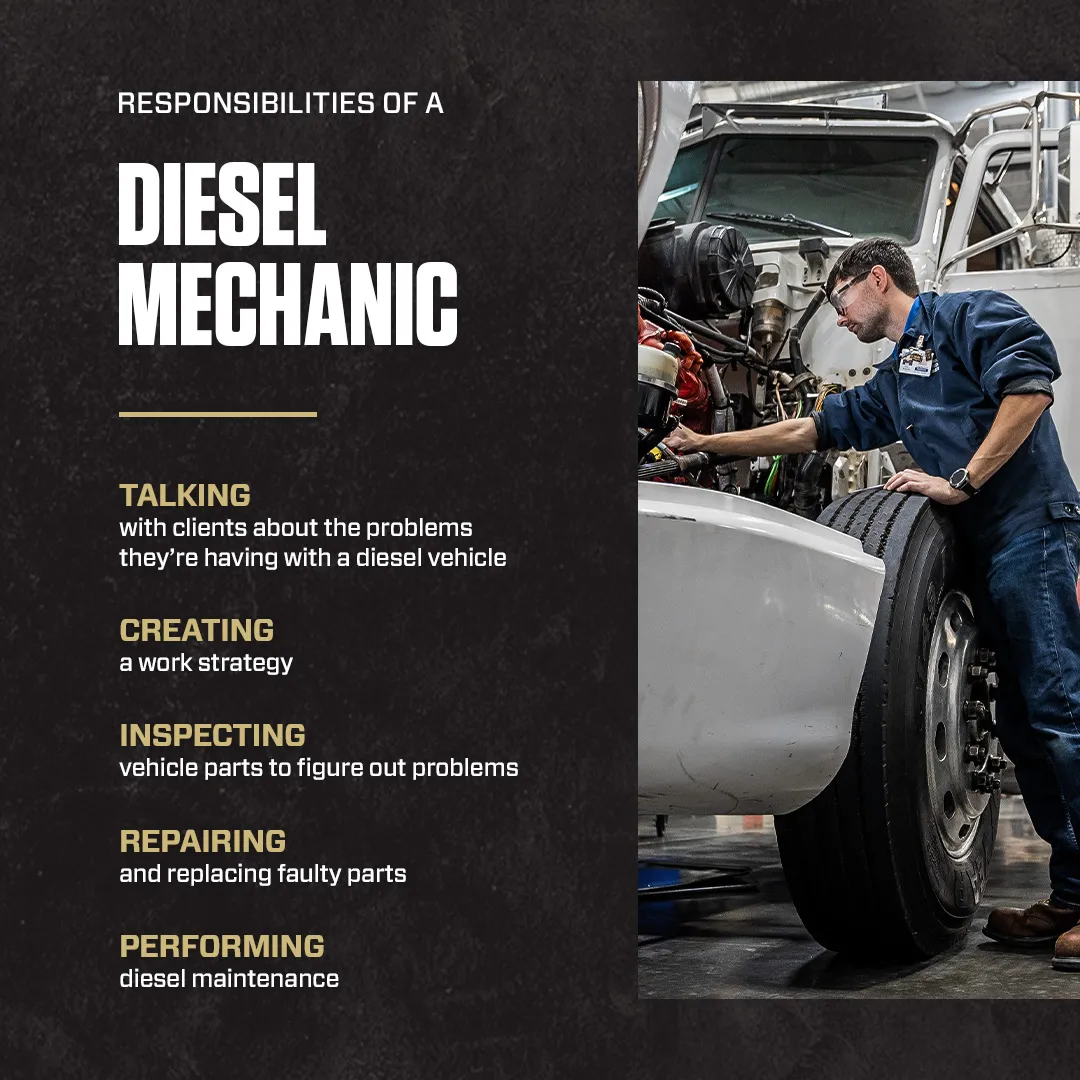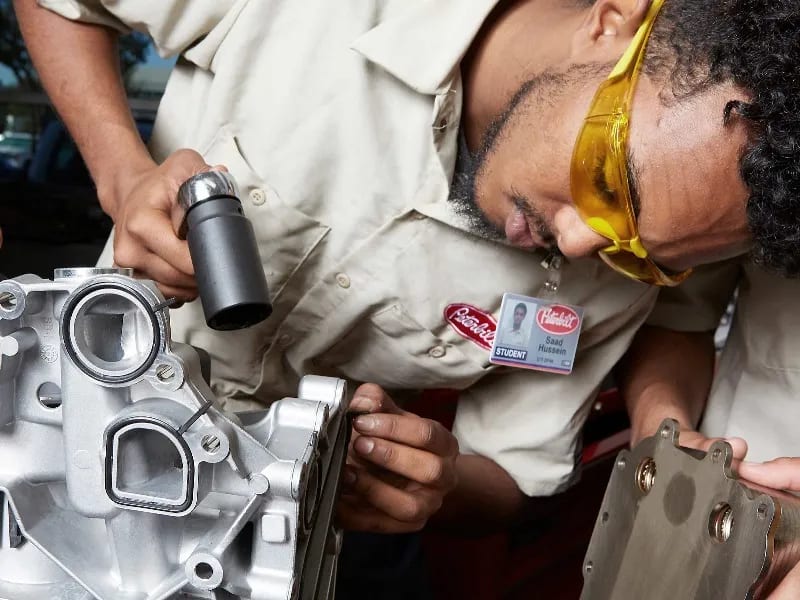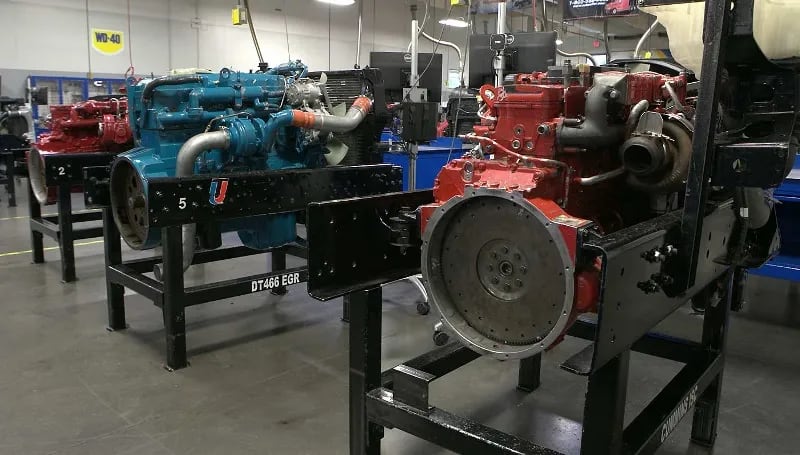What Is a Mobile Diesel Mechanic?
What is a mobile diesel mechanic, and how do you become one? Find out in this career guide.
A career as a diesel mechanic can be a fulfilling one if you enjoy working with your hands and want to service engines that power some of the country’s most dynamic vehicles.
If you’re wondering how long it takes to train to become a diesel technician at Universal Technical Institute (UTI), the answer depends on which program you choose and how specialized the training is.1
Interested in becoming a diesel mechanic? Read on for more about training opportunities through UTI’s 45-week Diesel Technology program!7
In the field, diesel mechanics are responsible for diagnosing and repairing diesel engines and vehicles. Many diesel mechanics work in shops, while others might be mobile diesel mechanics, bringing their services directly to customers. Their roles and duties include:
Diesel engines power the country’s biggest trucks, large vehicles and machinery, like farm equipment. They’re essential to keeping the country up and running, which is one of the reasons that diesel mechanics are so important.
Read: How to Train to Become a Bus Mechanic

According to the U.S. Bureau of Labor Statistics (BLS), the median annual salary for bus and truck mechanics and diesel engine specialists in the U.S. was $54,360 in May 2022.29
This means half of diesel technicians earned more and half earned less. Keep in mind that the diesel technician salary depends on several factors, including experience, employer, demand and cost of living in the area.
Read: She’s a Full-Time Diesel Technician at Just 19 Years Old
To become a diesel mechanic, training applicants usually need a high school diploma or GED. Some mechanics choose to learn skills on the job and work their way up, while others enroll in a formal school for diesel mechanic training.
Some benefits of enrolling in a formal training program like UTI’s Diesel Technology program include:
Read: What Is a Heavy-Duty Diesel Mechanic?
To apply for the core Diesel Technology program at UTI, the following diesel mechanic admissions requirements must be met.
Students who are applying from outside of the United States are also required to submit foreign education documents. These documents must be confirmed as valid proof of high school completion.
Read: High Pressure, High Stakes, High Rewards for UTI Avondale Diesel Program Graduate
One of the differences between a trade school and a traditional college is that in a diesel program at a trade school, attendees are surrounded by other students who are passionate about and interested in the same thing they’re studying: diesel engines.
There are also no general education requirements, which means that you don’t need to take classes teaching topics you didn’t enroll for, like many traditional colleges require. Instead, you can use your time studying the subjects that actually interest you.

Attending a school for diesel mechanic training gives students hands-on training in state-of-the-industry labs. With diesel mechanic schooling, aspiring techs train on diesel equipment encountered in the real world. 18
You also get the opportunity to practice and make mistakes so you can learn. UTI instructors have experience working in the diesel industry, so they’ll be able to tell you what graduates can expect in the field.
At some colleges and universities, professors graduate then go right back to school to teach. At UTI, our instructors come directly from the field.
Trade school might feature a mix of instruction, too. Students might view lectures online and then practice those concepts in the lab.
This type of instruction is different from traditional colleges, which might have lectures with hundreds of people in them, with little other option but to listen to a professor. If you’re a hands-on or visual learner, lecture-only classes at traditional colleges can be tough to get through.
Speaking of class sizes, that’s another difference between trade schools and traditional colleges. While traditional colleges might have large classes, trade schools deliberately have small class sizes, allowing students to receive one-on-one attention from instructors and get hands-on learning opportunities.
Another benefit of trade schools is that extracurricular events tend to be focused on what students are interested in, like cars and other vehicles. At UTI, events like car shows and drag races give students a way to bond and have fun outside of the classroom.
Read: What Is a Locomotive Mechanic?
By completing a diesel mechanic degree or diesel mechanic certificate, graduates can use the credential when applying for jobs in the diesel field.
Diesel mechanics consult with customers and strategize repairs. They plan service procedures, inspect vehicle parts, run diagnostic tests and repair broken diesel equipment. Diesel mechanics typically use both computers and hand tools to diagnose and repair diesel components.
According to the BLS, the industries that were the largest employers of diesel mechanics in 2022 were:
Diesel mechanics often work in repair shops, but some work as mobile mechanics and repair vehicles at worksites or on the road. Some diesel mechanics go on to become shop managers or open their own diesel repair businesses.77
Read: After 35+ Years in the Industry, Diesel Pro Turns to Teaching.
At UTI, diesel mechanic students take a variety of diesel courses, covering topics that include:

Each course features hands-on components using industry-aligned tools and technology that technicians encounter in the professional world. Tests and final assessments are provided to help students grasp the curriculum.
Read: What Is a Mobile Diesel Mechanic?
Students who attend UTI's Diesel Technology program can learn the skills they need to succeed in an entry-level position as a diesel mechanic. While enrolled, aspiring techs will learn how to diagnose, repair and replace a variety of diesel engines, using real diesel machinery in lab environments.
After students complete the core diesel training program, they can apply to one of UTI’s Manufacturer-Specific Advanced Training programs featuring Cummins,46 Daimler Truck and Peterbilt.15 These specialized courses go deeper into each brand, teaching students manufacturer-specific topics like engines, fuel systems, brakes and chassis, climate control, hydraulic applications, electronic technology, refrigeration and preventative maintenance.
Read: What Is a Diesel Generator Technician?
Skilled diesel technicians are in demand. In fact, the BLS predicts there are more than 24,000 estimated average annual diesel technician job openings in the United States.43
According to the BLS, the median annual salary for bus and truck mechanics and diesel engine specialists in the United States was $54,360 in May 2022.29 This means half earned more and half earned less. Keep in mind that salary depends on several factors, including experience, employer, demand and cost of living in the area.
Read: UTI Grad Nestor Martinez: Our World Relies on Diesel Technicians
UTI’s diesel mechanic schools are located throughout the country, making it easy for students to find a location close to where they live or where they want to work. Our diesel mechanic school locations are:
Classes start every three weeks. You can view the diesel school calendar here.
Read: Light-Duty vs. Heavy-Duty Diesel Training: Which Is Right for Me?
Yes. Sites like Scholarships.com and Fastweb offer thousands of scholarships for all types of students, including soon-to-be high school graduates, military veterans and minorities. It’s possible to apply for scholarships based on your volunteer work, your unique experiences and interests and how you intend to use your diesel education.
UTI has also compiled a list of scholarships and grants available for students who qualify.10 To apply for scholarships, read the directions thoroughly. Gather all required materials, and make sure you turn in your application and required documents in time to meet the due date. Get more tips on how to apply for scholarships for diesel mechanic school.
Read: Meet Jazmin Rivera: UTI Grad, Diesel Technician and Business Owner
A typical diesel mechanic training program usually takes between 6 months and 2 years to complete. The duration varies based on the depth of the curriculum and the individual student's pace of learning. At Universal Technical Institute, diesel technology training takes just 45 weeks!7
Yes, some trade schools and community colleges offer specialized diesel mechanic training programs. At UTI, these programs include the Cummins Engines,46 Cummins Power Generation,46 Daimler Truck North America (DTNA) Finish First and Peterbilt Technician Institute15 training programs!
Most diesel mechanic schools require a high school diploma or GED to sign up. Some may also require a basic understanding of diesel mechanics. At UTI, experienced instructors will teach students from the ground up, even if they have neither prior knowledge of nor experience with the industry’s technologies.
While it's possible to become a diesel mechanic through on-the-job training, getting a job without formal schooling can be difficult. Completing UTI’s diesel training counts toward eligibility for ASE certification testing.16
Yes. For those interested in diesel mechanic schooling at UTI, there are several financial aid options available to those who qualify. These options include federal student loans, scholarships and grants.10 Our Career Services advisors may also help students pursue part-time work-study options while enrolled.
Part-time work opportunities may also be available through the Early Employment Program, which helps connect potential employers with eligible students so they can find industry work while taking courses.36
If you’d like to learn more about attending a trade school for diesel mechanic training, contact UTI online or by calling us at 1-800-834-7308. Our Admissions Representatives can answer any questions you might have and help you learn more by providing more information about our program!
Universal Technical Institute of Illinois, Inc. is approved by the Division of Private Business and Vocational Schools of the Illinois Board of Higher Education.